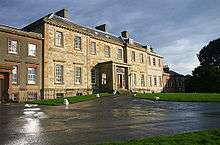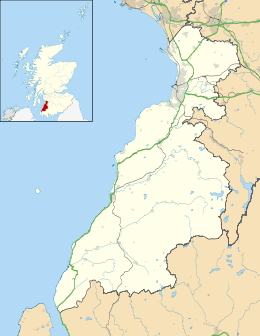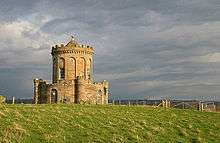Auchincruive
Auchincruive is a former country house and estate in South Ayrshire, Scotland. It is located 4 kilometres (2.5 mi) east of Ayr, on the north bank of the River Ayr. Auchincruive House was built in the 18th century on the site of an earlier mansion. In 1927, the estate became the West of Scotland College of Agriculture, and the house was renamed Oswald Hall. The college became the Scottish Agricultural College in 1990. In 2007 the college announced that the site would be disposed of for redevelopment, and masterplan proposals were approved by South Ayrshire Council in January 2011.[1] The house is protected as a category A listed building, along with other buildings on the estate.[2] The estate is included on the Inventory of Gardens and Designed Landscapes in Scotland, the national listing of significant gardens.[3]
| Auchincruive | |
|---|---|
 Auchincruive House, now known as Oswald Hall | |
| Location | Ayr, Scotland |
| Coordinates | 55.478466°N 4.552322°W |
| Built | 1767 |
| Architect | Robert Adam |
Listed Building – Category A | |
| Designated | 14 April 1971 |
| Reference no. | LB99 |
| Designated | 1 July 1987 |
| Reference no. | GDL00031 |
 Location in South Ayrshire | |
History
The lands of Auchincruive passed from the Wallace family to the Cathcarts in 1374, although the first record of a house is in 1532, when a tower house stood on the site of the present building.[4] The layout of the estate was formalised from 1723, to designs by William Boutcher, Sr. This included planting north and south of the river, as shown on General Roy's map of 1750.[3]
In 1758 the estate passed to James Murray of Broughton, who sold it in 1764 to the merchant and slave-trader Richard Oswald,[5] who built the present Auchincruive House. Robert Adam provided a design for a house to James Murray in 1764, although Oswald built the house, in modified form, in 1767. Adam's scheme for the interiors was carried out as planned.[2] Adam also designed Oswald's Temple, a castellated temple or tea-house, which stands on a nearby hill and was completed in 1778.[6] Oswald was appointed as the British peace commissioner who negotiated the Treaty of Paris in 1783 when the American War of Independence came to an end.[7][8] After the negotiations, he retired to Auchincruive where he died the following year.[9][10]
An east wing was later built on to the house, and alterations, including addition of the west wing, were made after the estate was inherited by George Oswald in 1819. In 1925 the estate was sold by the Oswalds to John Hannah, a local farmer, who bequeathed it in 1927 to the Secretary of State for Scotland, for use as the West of Scotland Agricultural College.[2] Over the next 50 years, the college erected a number of buildings within the grounds to cater for their educational and research requirements.[3] Oswald Hall continued in use, but the temple deteriorated, and in 2003 it was included on the Buildings at Risk Register for Scotland, its condition assessed as "very poor".[11]

By 2007, the Scottish Agricultural College, formed in 1990 from the merger of the West of Scotland College of Agriculture and other agricultural colleges, had decided to move its educational campus to a new site in Ayr. Plans to redevelop the core of the Auchincruive site as a research facility, while selling off the remaining part of the 246-hectare (610-acre) estate for housing and golf course development, were approved by South Ayrshire Council in January 2011. The plans involve the restoration of listed buildings and historic landscape features, and construction of 400–500 houses and a business research campus. Oswald Hall would become a hotel and conference centre, with Oswald's Temple used as additional accommodation.[12] However, in December 2012 Oswald Hall was sold for $1.5m (£1.0m) to biotech company Neogen Europe to be used as its corporate offices, with its Managing Director, Dr Stephen Holmes, being a former scientist at the college.[13][14]
See also
- Auchincruive Waggonway
- Wallace's Heel Well - William Wallace found shelter in the nearby Leglen Wood.
References
- "Proposals for the Auchincruive Estate, Ayr". Scottish Agricultural College. Archived from the original on 19 July 2011. Retrieved 4 February 2011.
- Historic Environment Scotland. "AUCHINCRUIVE ESTATE, OSWALD HALL (Category A) (LB99)". Retrieved 5 March 2019.
- Historic Environment Scotland. "AUCHINCRUIVE (GDL00031)". Retrieved 5 March 2019.
- "Auchincruive House". CANMORE. RCAHMS.
- Hancock, David (1997). Citizens of the World: London Merchants and the Integration of the British Atlantic Community, 1735–1785. Cambridge University Press. p. 151. ISBN 9780521629423.
- Historic Environment Scotland. "AUCHINCRUIVE ESTATE, OSWALD'S TEMPLE (TEA HOUSE) (Category A) (LB996)". Retrieved 5 March 2019.
- "BBC - History - British History in depth: The Business of Enslavement". BBC Online. Retrieved 12 February 2011.
- (Earl), Philip Henry Stanhope Stanhope (1854). History of England from the peace of Utrecht to the peace of Versailles, 1713-1783. John Murray. p. 265.
- Eddie, Graeme D (Archivist). "Correspondence of the Oswald family of Auchincruive, including Richard Oswald (1705-1784)". Edinburgh University Library, Special Collections Division. Archived from the original on 22 September 2010. Retrieved 15 February 2011.
Richard Oswald died at Auchincruive on 6 November 1784. On his death, the whole of his property was left in life-rent to his widow, Mary Alexander Ramsay who died on 6 December 1788.
- Renwick, Robert; John, Lindsay (1921). "XXIX - A Typical Glasgow Family". The History of Glasgow. 3. Maclehose, Jackson & Co.
Availing himself of the opportunity Oswald made large purchases of lands. He was said to have invested over half a million sterling in this way, and to have had a rent-roll of £20,000. Among other possessions he acquired the estate of Auchencruive, near Ayr, which he made his chief residence. There he died in 1784—just a year after his crowning achievement, the negotiation of the treaty of peace with America. [Glasgow Journal, 11th Nov. 1784.]
- "Auchincruive Teahouse". Buildings at Risk Register for Scotland. Historic Environment Scotland.
- "Report By Depute Chief Executive And Executive Director Of Development & Environment: Planning Application Report 09/01416/PPPM Auchincruive Estate" (PDF). South Ayrshire Council. 19 January 2011. Archived from the original (PDF) on 19 July 2011. Retrieved 4 February 2011.
- "Neogen Annual Report 2013 page 16" (PDF).
- "Through the keyhole of historic Oswald Hall". Ayr Advertiser. 10 February 2014. Archived from the original on 21 February 2014.